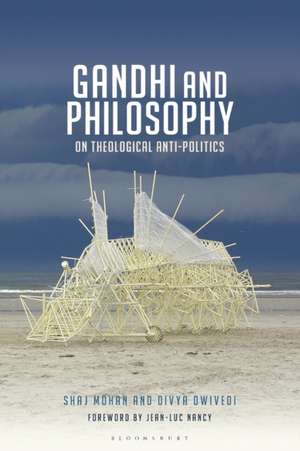Gandhi and Philosophy: On Theological Anti-Politics
Autor Shaj Mohan, Divya Dwivedi Cuvânt înainte de Jean-Luc Nancyen Limba Engleză Paperback – 24 iun 2020
| Toate formatele și edițiile | Preț | Express |
|---|---|---|
| Paperback (1) | 225.31 lei 6-8 săpt. | |
| Bloomsbury Publishing – 24 iun 2020 | 225.31 lei 6-8 săpt. | |
| Hardback (1) | 657.87 lei 6-8 săpt. | |
| Bloomsbury Publishing – 12 dec 2018 | 657.87 lei 6-8 săpt. |
Preț: 225.31 lei
Preț vechi: 289.16 lei
-22% Nou
Puncte Express: 338
Preț estimativ în valută:
43.11€ • 45.13$ • 35.67£
43.11€ • 45.13$ • 35.67£
Carte tipărită la comandă
Livrare economică 05-19 aprilie
Preluare comenzi: 021 569.72.76
Specificații
ISBN-13: 9781350169128
ISBN-10: 1350169129
Pagini: 288
Dimensiuni: 156 x 234 x 19 mm
Greutate: 0.4 kg
Editura: Bloomsbury Publishing
Colecția Bloomsbury Academic
Locul publicării:London, United Kingdom
ISBN-10: 1350169129
Pagini: 288
Dimensiuni: 156 x 234 x 19 mm
Greutate: 0.4 kg
Editura: Bloomsbury Publishing
Colecția Bloomsbury Academic
Locul publicării:London, United Kingdom
Caracteristici
Provides an objective interpretation of Gandhi, removing him from standard indo-centric and postcolonial narratives
Notă biografică
Shaj Mohan is a philosopher based in the subcontinent.Divya Dwivedi is a philosopher based in the subcontinent. She is Assistant Professor in the Department of Humanities and Social Sciences at the Indian Institute of Technology Delhi.
Cuprins
DedicationAcknowledgementsPreface1. Hypophysics2. Scalology3. The Faculties 1: Body4. The Faculties 2: Mind and Soul5. Dynamics: Active and Passive6. The Law of the Maker7. Truth and Will8. Violence and Resistance9. Critical Nation10. ConclusionBibliographyIndex
Recenzii
This book of philosophy from the subcontinent is a new beginning for philosophy everywhere, because it liberates philosophy from metaphysical and theological thinking. It also frees philosophy from the geo-political and ethnocentric divisions of east and west.
A unique book that endeavours to go beyond the usual study of the Mahatma, his role in the freedom struggle and his ideology of non-violence ... Gives new meanings to concepts such as resistance, power, truth and force.
Gandhi and Philosophy: On Theological Anti-Politics is something that has been crying out to be done, but that no-one before Shaj Mohan and Divya Dwivedi seem to have thought seriously of doing. It adds a new approach and addition to the study of Gandhian thought. It is a most valuable and original contribution.
Shaj Mohan and Divya Dwivedi's Gandhi and Philosophy is a profound and at crucial points critical re-examination of Gandhi's thought. But their book does much more than give us a radically new Gandhi. It is a sophisticated reflection on modernity in its own right. Drawing on a wide range of philosophical resources, Gandhi and Philosophy succeeds in expanding our horizons and in opening up new lines of thought.
A figure of spiritual resistance to modernity, today Gandhi draws the limits of geopolitics as we can test them in the planetary regression characteristic of the beginning of this century. Mohan and Dwivedi reveal the main lines of his thought circumscribing the limits of the East-West division as well as the ambiguities of a politics of resistance whose project would have been, ultimately, to create a Hindu nation invested with a global eschatological mission - the old schema. By reaffirming the need of critique for what they call ana-stasis, they give us to reconsider the history of nihilism in the eschatological contemporaneity and shows its ultimate limits.
This is how this book comes to our attention and contributes to orient us, if I may say so, toward a thought, and even a world, neither humanist nor reduced to suffering in the name of Truth. In the terms of this work: neither metaphysics nor hypophysics.
Gandhi and Philosophy reclaims Gandhi as one of the great Enlightenment thinkers of "system", a philosophical identification of nature with law, morality and the good that positions him in the line of Spinoza, Newton, Wordsworth and contemporary deep ecology. With unerring tact and remorseless precision, Mohan and Dwivedi unpick the interlocking sets of principles that enabled Gandhi's controversial remediation of political, cultural, and social modernity as transgressions of humanity's maximum limits and destructions of futurity-a critique derived from the logics of a philosophical position that Mohan and Dwivedi resituate as a formidable force for our times.
A unique book that endeavours to go beyond the usual study of the Mahatma, his role in the freedom struggle and his ideology of non-violence ... Gives new meanings to concepts such as resistance, power, truth and force.
Gandhi and Philosophy: On Theological Anti-Politics is something that has been crying out to be done, but that no-one before Shaj Mohan and Divya Dwivedi seem to have thought seriously of doing. It adds a new approach and addition to the study of Gandhian thought. It is a most valuable and original contribution.
Shaj Mohan and Divya Dwivedi's Gandhi and Philosophy is a profound and at crucial points critical re-examination of Gandhi's thought. But their book does much more than give us a radically new Gandhi. It is a sophisticated reflection on modernity in its own right. Drawing on a wide range of philosophical resources, Gandhi and Philosophy succeeds in expanding our horizons and in opening up new lines of thought.
A figure of spiritual resistance to modernity, today Gandhi draws the limits of geopolitics as we can test them in the planetary regression characteristic of the beginning of this century. Mohan and Dwivedi reveal the main lines of his thought circumscribing the limits of the East-West division as well as the ambiguities of a politics of resistance whose project would have been, ultimately, to create a Hindu nation invested with a global eschatological mission - the old schema. By reaffirming the need of critique for what they call ana-stasis, they give us to reconsider the history of nihilism in the eschatological contemporaneity and shows its ultimate limits.
This is how this book comes to our attention and contributes to orient us, if I may say so, toward a thought, and even a world, neither humanist nor reduced to suffering in the name of Truth. In the terms of this work: neither metaphysics nor hypophysics.
Gandhi and Philosophy reclaims Gandhi as one of the great Enlightenment thinkers of "system", a philosophical identification of nature with law, morality and the good that positions him in the line of Spinoza, Newton, Wordsworth and contemporary deep ecology. With unerring tact and remorseless precision, Mohan and Dwivedi unpick the interlocking sets of principles that enabled Gandhi's controversial remediation of political, cultural, and social modernity as transgressions of humanity's maximum limits and destructions of futurity-a critique derived from the logics of a philosophical position that Mohan and Dwivedi resituate as a formidable force for our times.










